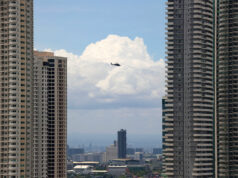THE Philippines was the least likely to benefit from the United States-China trade war out of 13 Asia-Pacific economies, Japanese banking group Nomura said in a report, which assessed their first quarter trade performance.
In its “Emerging Markets Special Report” published June 3, the Japanese bank said the Philippines was 22nd on the list of potential beneficiaries from the trade tensions out of 50 economies studied.
The economy that benefitted most from the trade diversion was Vietnam with a potential boost of 7.9% to gross domestic product (GDP).
Following Vietnam was Taiwan at 2.1%, Chile at 1.5%, Malaysia at 1.3% and Argentina at 1.2%.
Vietnam and Taiwan benefitted mainly from additional US imports while Chile, Malaysia and Argentina gained mainly from additional China imports.
Meanwhile, the boost to Philippine trade was equivalent only to 0.1% of GDP.
The Philippines’ US imports are estimated to have risen 0.2% as a result of the trade war, Nomura said.
Meanwhile, trade with China associated with import substitution declined 0.1%..
The Nomura report also found that the loss to China (-0.5% of GDP) is more than the loss to US (-0.3% of GDP), in line with the higher share of US exports in China’s GDP.
Among the regions, Asia, except China, and the Americas, except the US, are the biggest gainers, with Asia benefitting more from additional US imports representing lost Chinese orders, and the Americas gaining more from additional Chinese imports representing lost US orders.
In a study last year that selected trade war gainers, Nomura said the Asian countries that will benefit most are Malaysia, Japan, Pakistan, Thailand, the Philippines and Vietnam.
The 2018 Nomura report is in line with the findings of a United Nations Conference on Trade and Development (UNCTAD) report which estimates that, of the $250 billion in Chinese exports subject to US tariffs of 25%, a full 82% will be captured by firms in other countries, 12% will be retained by Chinese firms and only 6% will be captured by US firms.
The UNCTAD study expects the Philippines to capture about 3.2% of the trade diverted from US and China.
Economists and analysts have also said the Philippines stands to gain in the trade war in the short term, citing possible relocations of directly affected firms.
However, the Philippine Economic Zone Authority (PEZA), the country’s second biggest investment promotion agency, has said the Philippines is missing out on investment opportunities due to uncertainties surrounding the government’s push to alter the fiscal incentives regime.
PEZA Director-General Charito B. Plaza said she has met with about 20 firms, mostly from China, inquiring about the possibility of transferring operations here. Some, however, have already transferred elsewhere. — Janina C. Lim



